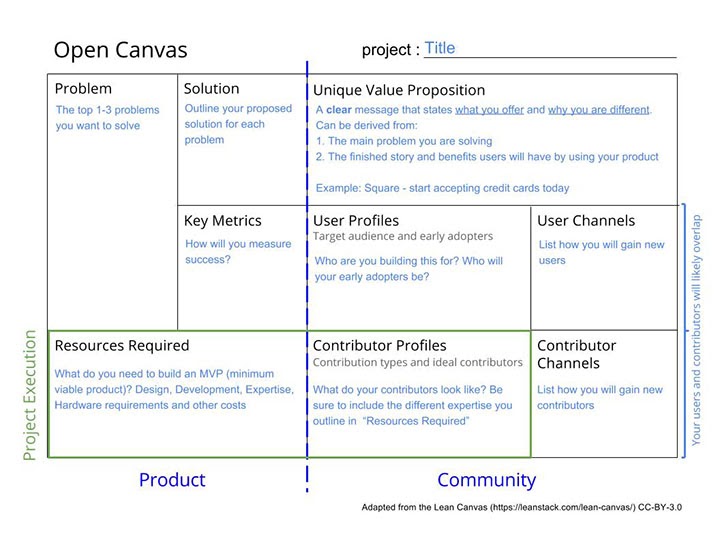Image: A tool we relied on to prepare the participants was the Open Canvas, a quick resource to clarify the project idea and community needs/contributions. The Open Canvas is adapted from the Lean Canvas and is also part of the Mozilla’s Open Leaders training program.
The OPEN (Open Project Engagement Network) Incubator is a program facilitated by the Copyright and Digital Scholarship Center at NC State University Libraries, designed to advance a research project from idea to proof-of-concept. Started in 2019, the program invites a cohort of researchers with specific projects and then encourages participants to identify “open interventions” that will produce research outputs that are findable, accessible, interoperable, and reusable (FAIR). The OPEN Inc. team hosted the third iteration of the incubator in December 2020 with five research projects participating.
The goal is to help people develop their research ideas by introducing open resources, methods, and workflows that will be applicable to their projects, all while building a community of collaborators who are invested in doing open research. In previous incubators, we’ve been lucky to work with software developers, rhetoric/media scholars, microbiologists, historians, and more.
This winter’s OPEN Incubator looked a little bit different for two reasons. First, we decided to focus on text analysis as a theme for the incubator. Having common ground for each project helped us focus the materials and resources we shared, but it also offered an interesting perspective on text analysis work across disciplines. We had projects from disciplines like education, ecology, biology, and the humanities, and seeing the variety showed off the range that text analysis can bring — every discipline uses text(s) in some way.
Secondly, this winter’s OPEN Incubator took on a different format to make the best use of a virtual event (and scheduling constraints). Instead of meeting several times over a series of weeks, the Season 3 cohort met just once for a mad dash 3-hour sprint. We did a tour through three key open topics that centered around text analysis research. These were each facilitated by a different person from the Libraries and done in mini-sprint style: a brief grounding in the topic, a hands-on activity, discussion, and finally a break. Our schedule for the three hours was:
- Welcome and introduction
- Open principles and practices
- Open tools and methods
- Open text analysis with closed sources
- Wildcard resources
- Finding next steps
With such little time, it was important for each section to include a time for discussion, reflection, and a chance to directly apply the work to each team’s project. The sections each offered a starting place for participants, and we’re hoping that researchers will build on this as they continue to do their research.
The entire sprint was shaped using the ADIDS model, which stands for Activity, Discussion, Input, Deepening, and Synthesis. We did introductory activities during the welcome and in the first sprint (open principles and practices) so that participants could share about their projects and ideas to find open interventions in their work. We followed that with discussion as a group about those topics. Our input section, which is meant to add experiences and advanced concepts to the discussion, was in “open tools and practices,” where we gave resources and examples of how each would be used in an open research process. Deepening was in “open text analysis with closed sources,” which focused specifically on issues relating to text analysis corpuses. We finished with a wildcard discussion session for synthesis, which allowed participants to bring up anything they still needed answered or bring up topics that we had already discussed for more thoughts. In our wrap-up, we talked about next steps and how we would continue the work for each project.
Because we had to offer this round of the incubator in a fully virtual, sprint format, we are following up with each project team to offer another round of consultations based from the Incubator. Our hope is that the consultations will lead to collaborative project work, allowing us to bring some of those open interventions to fruition. Overall, the Incubator program has been really rewarding, gathering a small, cross-disciplinary group to talk and learn together. All our materials are available and reusable1, and we will begin planning for the next incubator (to be focused on data bias and ethics) in the Fall semester of 2021.
Post contributed by Claire Cahoon, NCSU Libraries Fellow, and Micah Vandegrift, NCSU Open Knowledge Librarian.
Notes
- Vandegrift, M., Cahoon, C., Mentnech, T., Cox, E., Partlow, M., Cross, W., … Argabright, L. (2020, December 15). OPEN Incubator. https://doi.org/10.17605/OSF.IO/SPKZ9 ↩

